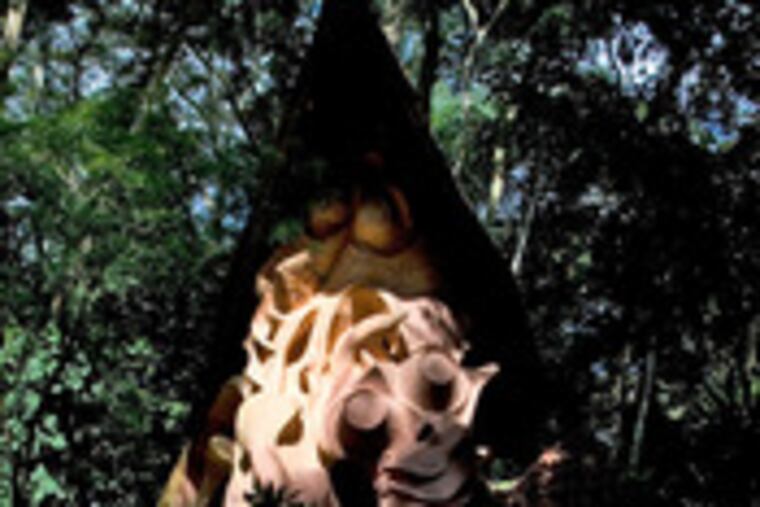
ACHINA, Nigeria - Born to a family of traditional priests, Ibe Nwigwe converted to Christianity as a boy. Under the sway of born-again fervor as a man, he gathered the paraphernalia of ancestral worship - a centuries-old stool, a metal staff with a wooden handle, and the carved figure of a god - and burned them as his pastor watched.
"I had experienced a series of misfortunes, and my pastor told me it was because I had not completely broken the covenant with my ancestral idols," Nwigwe, 52, said of the bonfire three years ago. "Now that I have done that, I hope I will be truly liberated."
Generations ago, European colonists and Christian missionaries looted Africa's ancient treasures. Now, Pentecostal evangelists - most of them Africans - are helping to wipe out remaining traces of how Africans worked, played and prayed.
As poverty deepened in Nigeria from the mid-1980s, Pentecostal church membership surged. The new faithful found comfort in preachers such as the evangelist Uma Ukpai, who promised that material success was next to godliness. He has boasted of overseeing the destruction of more than 100 shrines in one district in December 2005.
Achina is typical of towns and villages in the Igbo-dominated Christian belt of southeastern Nigeria where this new fundamentalism is evident. The old gods are being linked to the devil, and preachers are urging not only their rejection but their destruction.
The Ezeokolo, the main shrine of Achina - a community of mainly farmers and traders in Nigeria's rain-forest belt - has been repeatedly looted of its carved god figures. While no one has been caught, suspects range from people acting on Christian impulses to treasure thieves.
Recently, a village civic association volunteered to build a house to keep burglars away from a giant wooden gong decorated with male, female and snake figures. The gong in the market square is reputed to be more than 400 years old, and in decades past was sounded in times of emergency.
"We feared it may be stolen or destroyed, like so many of our traditional cultural symbols," said Chuma Ezenwa, a Lagos lawyer.
But the move to protect a communal symbol has not changed the minds of others.
Ikechukwu Nzekwe, a 48-year-old farmer who belongs to a traditional masquerade cult, rues the action of his younger brother, a born-again Christian who destroyed the family's masquerade costume, including pieces dating back seven generations.
The masquerade cult was once part theater, appearing at festivals to perform songs and dances, and part police - its members helped enforce mores and customs. Now its role is largely restricted to theater, including performances and races by men in costumes depicting ancestral spirits.
Ukpai, the evangelist, tells followers that the artifacts bear "curses and covenants" linked to the gods they represent.
"Since the curses and covenants do not automatically disappear when we repent, the Rev. Dr. Uma Ukpai is a man called by God for the total liberation of mankind," he says on his Web site, claiming to have the spiritual backing of Jesus to break the curses.
Efforts to speak to Ukpai were unsuccessful, and e-mails to his office asking for an interview received no reply.
Early missionaries to Nigeria condemned most traditional practices as pagan. Roman Catholics and Anglicans came to terms with most of the practices, incorporating some traditional dances into church liturgy. But there was no room for local gods once their worshippers became Christians.
Similarly, Muslim preachers in Nigeria's predominantly Islamic north forbade interaction with figures dedicated to local idols, although many cultural dances featuring traditional masks are tolerated.
Most converts are in constant tension over how much of the old beliefs can be incorporated into their new faith, said Isidore Uzoatu, a specialist in the history of Christianity in Africa affiliated with Nnamdi Azikiwe University in southeastern Nigeria.
"Where the older Catholic and Anglican denominations are more tolerant, the Pentecostals reflect more strictly the idea of a jealous God that would brook no rival," said Uzoatu.
The changing attitudes have not escaped the attention of art dealers.
"This work you see here is from a shrine. It was brought to me by one woman who said her pastor had asked her to get rid of it," said Wahid Mumuni, a dealer at the Ikoyi Hotel in Lagos, gesturing toward a carving.
Mumuni said that the price was the equivalent of $1,500 and that he expected a European visitor to take it away soon.
The National Commission for Museums and Monuments, which is responsible for protecting the country's cultural antiquities, has responded with a sensitization campaign.
"We are ... telling the Christians that they can't detach themselves from their past, that there is a beginning to their history," said Omotosho Eluyemi, a senior commission official.